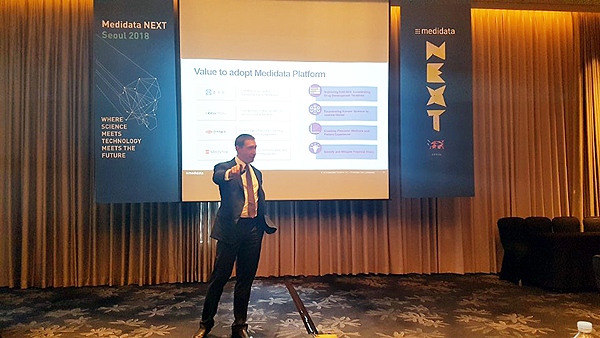“If you use Medidata’s solution, you can shorten the time of new drug development by more than six months.”
The comment was the summary of what Glen de Vries, president and co-founder of Medidata Solutions, said about the firm’s advantageous technologies for clinical trials during a news conference in Seoul Tuesday.
The health tech firm holds a conference every year inviting professionals from drugmakers, university hospitals, clinical trial centers, and clinical research organizations (CRO) to talk about innovative ideas for clinical trials. This year, the event “Medidata NEXT Seoul 2018” themed on “The NEXT Generation of Clinical Development” at Conrad Seoul in Yeouido.
“Korea is a very important country in life sciences. Korean pharmaceutical firms are aiming to expand to the global market with significant potential,” de Vries said. “Our goal is to help them play in the global market not only in the present time but in the future.”
Medidata had 164 clients in Asia as of 2016, mostly Korean and Chinese.
Medidata’s Korea Country Manager Lim Woo-sung said, “Medidata is working with 56 local drugmakers and biotech venture firms. Accumulated clinical trials using Medidata’s solutions have exceeded 200.”
The company attributed its rapid growth in Asia to various solutions for clinical research.
Medidata has established a system to trace the entire drug chain from the early stage of new drug development to post-market surveillance. The company provides various solutions such as RAVE and EDGE.

“Saving costs and optimizing operation are the two important keys for clinical trial solutions. Medidata will help you shorten the time for a new drug release by more than six months,” de Vries said.
According to de Vries, two pharmaceutical rivals submitted data to the Food and Drug Administration to win approval for similar drugs at the same time, one obtained the nod and released its product in the second quarter but the other failed to do so. The major difference was whether the company used Medidata’s solution, he said.
“The RAVE solution helps all hospital doctors and nurses around the world to study on one platform. It does not just input simple information but analyze it,” de Vries said. “We applied machine learning in RAVE. Our client company found information discrepancies using RAVE and gave the FDA sufficient explanation about the discrepancies. The client received approval quicker than its competitor and released the product faster.”
According to Medidata, the RAVE clinical trial solution directly helps a study progress, and EDGE raises data quality by diagnosing risks of clinical data and enables a trial to become strategic.
The company also provides services for analyzing which drugs are suitable for which patients, through collecting and analyzing data errors and genetic information.
Some drugmakers discovered a biomarker through such services, Medidata added.
At the conference at Conrad, Celltrion Vice President Lee Sang-joon spoke on “The Future of Korean pharmaceutical industry with the IT’s role in clinical research.”
Lee Dae-ho, a professor of oncology at Asan Medical Center, also gave a presentation on the “Patient-centered clinical trial environment.”
Medidata’s Chief Data Officer David Lee introduced ways to boost efficiency in clinical research through artificial intelligence and analytics.
Later in the day, participants shared success stories of Medidata’s clients including drug companies, hospitals, and universities. They included Chong Kun Dang, Medytox, LSK Global Pharma Services, MediInsight, Asan Medical Center, and the University of Tokyo.

